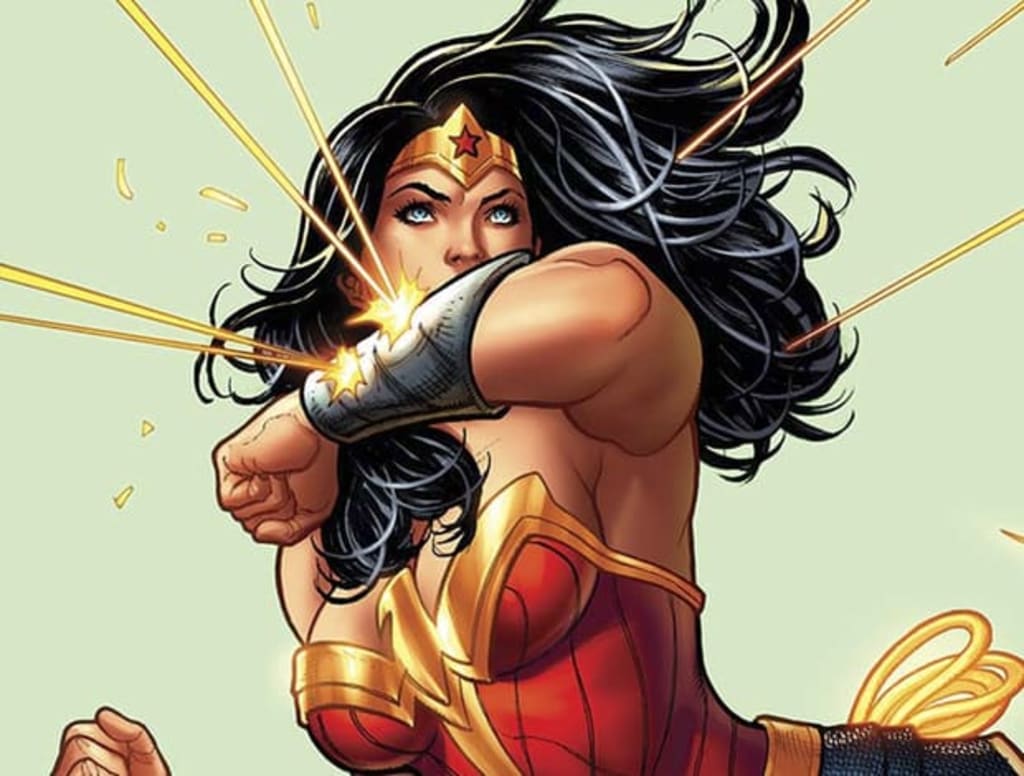
Comic Cons are a unique chance to sit in on some pretty important conversations. If you went to Lucca Comics and Games 2016 — an Italian Comic Con running this week — then you had the opportunity to sit in on a discussion about the future of comic book art. Controversial artists Milo Manara and Frank Cho held the modestly-titled panel "Frank Cho, Milo Manara And Women – A Dialogue Between Two Masters". There, they railed against censorship of their artistic styles, making a stand against the industry that — they claim — threatens to censor their art. Free speech for the win!
Why Are These Guys Controversial?
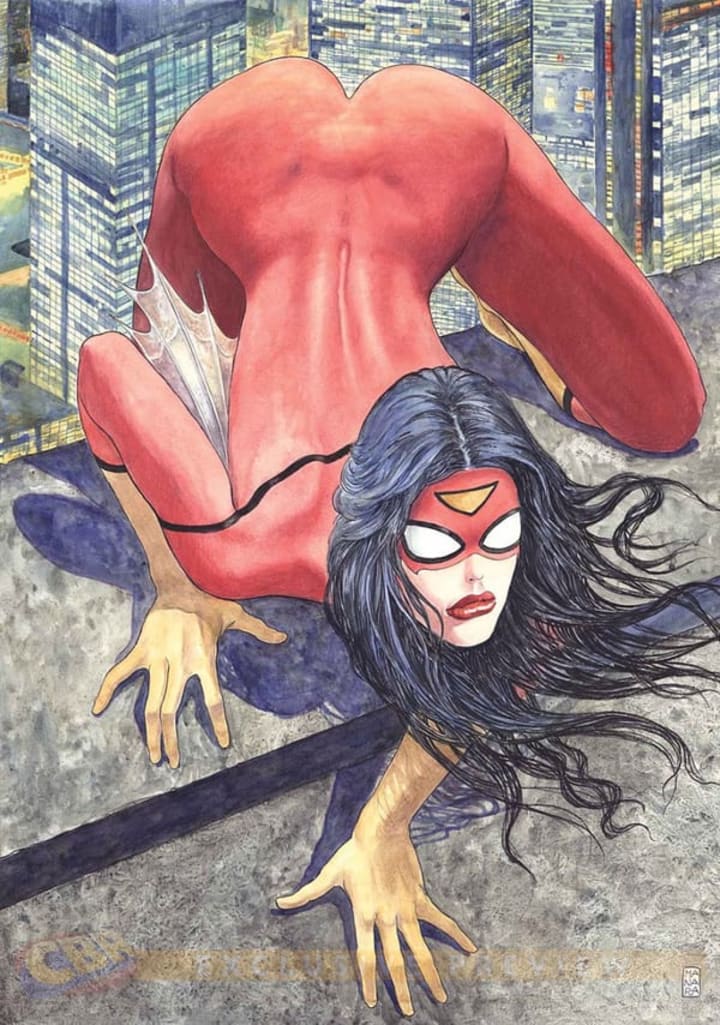
The (in)famous Milo Manara variant. Image: Marvel Comics
With a background in erotic comics, Milo Manara considers himself to be an expert on the female form. For years, he was a popular go-to-guy for Marvel's variant covers; until 2014, that is, when his variant cover for Spider-Woman #1 kind of broke the internet. Comic book fans looked at an impossibly sexualized cover, and fumed. Countless women decided to prove just how anatomically impossible this image was by attempting to strike the pose; none succeeded. No surprise, Marvel pulled the variant.
Meanwhile, Frank Cho is another artist who fancies himself a master at drawing women. There's nothing Cho loves more than to court controversy, so he decided to support Milo Manara in the only way he knew how. He picked up his pencils and started to draw.
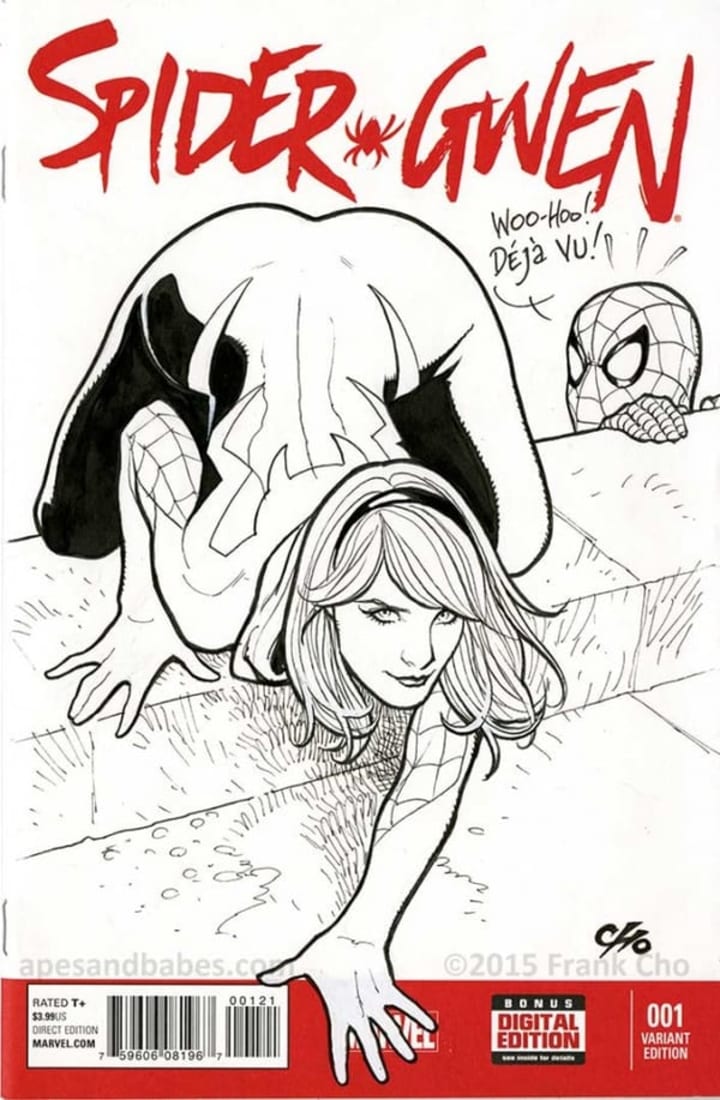
Tasteful, Cho. Image: Frank Cho
Given that Spider-Gwen is supposed to be a teenager, this took the tastelessness to a whole new level. Though he might be controversial, Cho continues to enjoy a career with the Big Two comic book companies — well, when he doesn't walk off books, anyway.
Earlier this year, he upped sticks and walked away from DC's tremendously popular Wonder Woman. In a statement to Bleeding Cool, he explained that it was because series writer Greg Rucka kept telling him how to draw.
"EVERYONE loves my Wonder Woman covers and wants me to stay. Greg Rucka is the ONLY one who has any problem with covers. Greg Rucka has been trying to alter and censor my artwork since day one.
Greg Rucka thought my Wonder Woman #3 cover was vulgar and showed too much skin, and has been spearheading censorship, which is baffling since my Wonder Woman image is on model and shows the same amount of skin as the interior art, and it’s a VARIANT COVER and he should have no editorial control over it. (But he does. WTF?!!!)
I tried to play nice, not rock the boat and do my best on the covers, but Greg’s weird political agenda against me and my art has made that job impossible. Wonder Woman was the ONLY reason I came over to DC Comics."

Greg Rucka apparently had to ask for the skirt to be LENGTHENED. Image: DC Comics
He later clarified to The Mary Sue that, when he'd been hired, he'd been told that only the Senior Art Director, Mark Chiarello, would have input into the variant covers; to be fair to Cho, this is pretty much the norm in the industry. Then, to Cho's frustration, Rucka began sending messages about how the variant cover should look - asking for the skirt to be lengthened, for example.
"And let’s face it, being told by a non-artistic freelancer what I can and cannot draw didn’t sit too well with me."
Rucka, who cared passionately about his book, was then contractually given responsibility for the whole Wonder Woman title — including variants. Cho walked.
Is This Censorship?
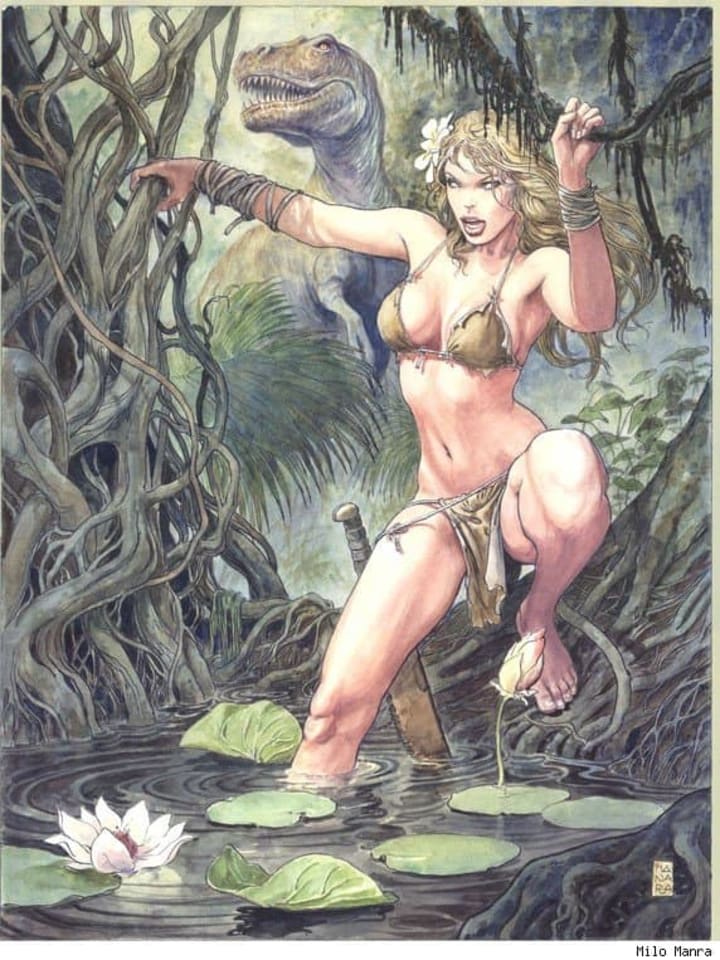
Milo Manara's Shanna the She-Devil variant. Image: Marvel Comics
I think it's safe to say that both Frank Cho and Milo Manara are both unrepentant and upset. To their minds, this is censorship, plain and simple. Their freedom to draw sexy women in anatomically impossible poses, and to display Wonder Woman's panties, is being restricted.
Except it's not. I have no problem with Frank Cho deciding to draw tasteless pictures of Spider-Gwen; he's free to do so. Likewise, if Milo Manara wants to do NSFW pictures of Marvel superheroes (more on that later), that's up to him. What I — and many fans — do have a problem with is when Marvel and DC let that kind of art become mainstream. As The Mary Sue put it:
"When comics fans complain about a particular variant cover, it’s less about the individual artist, and more about the company that lets certain sexist covers get through editorial for public consumption. And let’s be clear, when you’re only drawing female characters in sexual ways, that’s inherently sexist. You are objectifying the female form in a way you are not objectifying the male form. And sure, you could argue that “Hey, we’re straight men! We’re drawing what we like!” But it’s not like anyone’s hiring gay male or straight female artists to draw male characters in a sexualized fashion. The comics environment is clearly lopsided in favor of cis straight men–many of whom get upset when fans, and later the companies they work for, try to level the field a bit. God forbid they have their privilege taken away from them for a second."
Milo Manara's Spider-Woman variant was utterly inappropriate for the series; Dennis Hopeless was working on a series that would try to abandon the over-sexualized past of the character, trying to give her a strong arc and a new direction. Soon, the comic was abandoning that traditional skintight look completely.
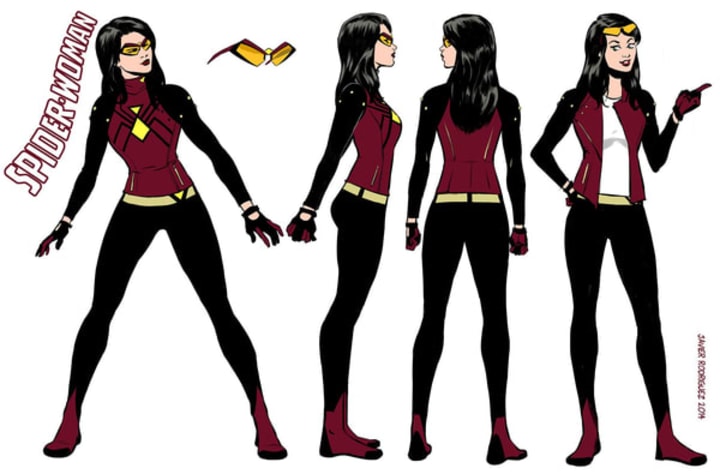
Spider-Woman's current look. Image: Marvel Comics
Likewise, I reckon Greg Rucka had realized something that Frank Cho clearly hasn't; that a variant cover is part of the package, and still impacts on how fans view the book as a whole. He wants his series of Wonder Woman to be associated with a certain style and tone — presumably one where the star character isn't being treated as eye candy. He probably negotiated rights to control variant covers precisely because he was concerned Cho's covers were undoing the work he was trying to do with the book. In other words, as the writer of Wonder Woman he knew that a variant cover is a bonus. It's not the core product.
Still, to Frank Cho and Milo Manara all this is clearly just censorship. In recognition of Cho's work to oppose censorship, Manara gifted him with this:
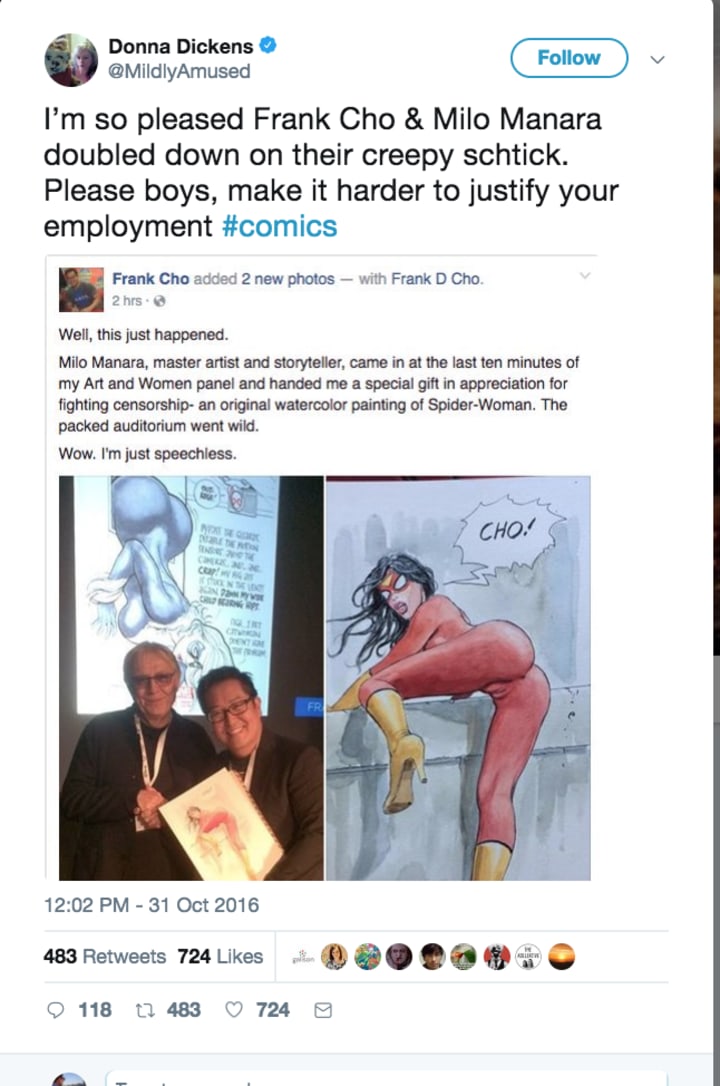
Let me be clear: this image alone is all the evidence we need that there is no censorship going on in comics. Milo Manara has just drawn one seriously NSFW image of Spider-Woman, a character who belongs to Marvel Comics. Marvel would be entirely within their rights to protect their trademark by coming down on Manara like a ton of bricks and telling him to stop abusing their trademark. There's so little censorship, though, that Marvel isn't even doing that. No, Marvel is letting Manara do his own thing; they're just not willing to pay him to do it. As a company, they've realized that using his art would be seen as an endorsement of his artistic choices, and that's no longer one they're willing to make. That's not censorship. That's realizing that comic book art has changed.
Robbi Rodriguez — designer of Spider-Gwen — made the same point, albeit more cuttingly.
As someone who brought this up before. You can blame the SJW agenda all you want for thinking you're being censored but...(1 of 2)— RobbiRodriguez (@RobbiRodriguez) October 27, 2016
but the bottom line is it not that. its just defending your laziness. (now 2 of 3)— RobbiRodriguez (@RobbiRodriguez) October 27, 2016
You can't argue "it's them, not me bro." when you haven't evolve as an artiest in 20 plus yrs.— RobbiRodriguez (@RobbiRodriguez) October 27, 2016
He couldn't resist one final comment:
you can have a style all you want but if dont change with the times and with the world you become a irrelevant dinosaur. artist evolve.— RobbiRodriguez (@RobbiRodriguez) October 27, 2016
Frank Cho and Milo Manara are good at what they do, but right now they've essentially declared that they're no longer interested in mainstream comics. They want to keep doing what they always did: pinups. That's fine. That's their right. But in making that choice, they have to recognize that their art no longer fits with the current fashion in comic books, and they shouldn't expect to be getting jobs from the Big Two any more.
To be honest, though, I rather think that Spider-Woman image — and, indeed, the whole Comic Con panel — is a pitch at a very different audience. I don't think Frank Cho and Milo Manara are interested in working for the Big Two any more. Instead, they're interested in playing the 'censorship card' in order to win the hearts and minds of comic book fans who don't like the way the world's changing. They're appealing to Right-wing voices who don't see a problem with over-sexualizing characters. Again, that's their right; they're artists, and they get to define their audience.
They don't get to cry 'censorship' because the rest of the world looks at them sideways for it, though.
About the Creator
Tom Bacon
A prolific writer and film fan, Tom has a deep love of the superhero genre.






Comments
There are no comments for this story
Be the first to respond and start the conversation.